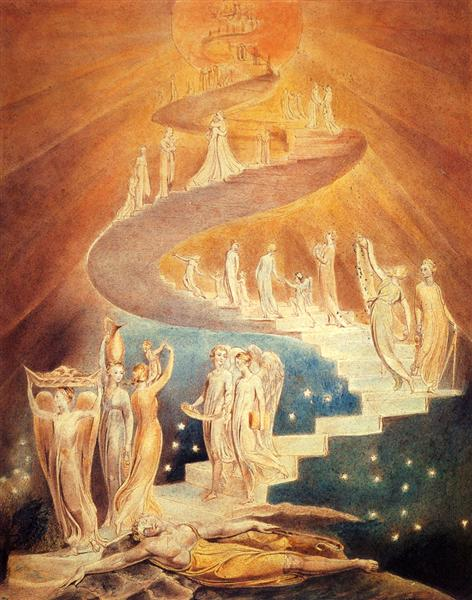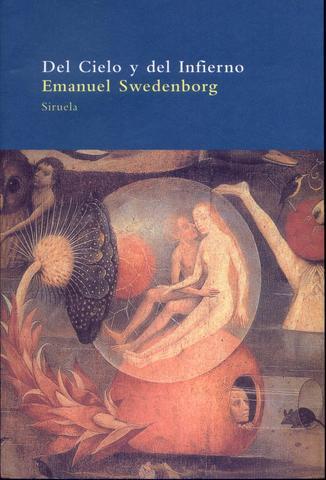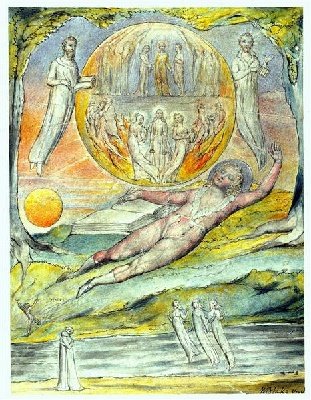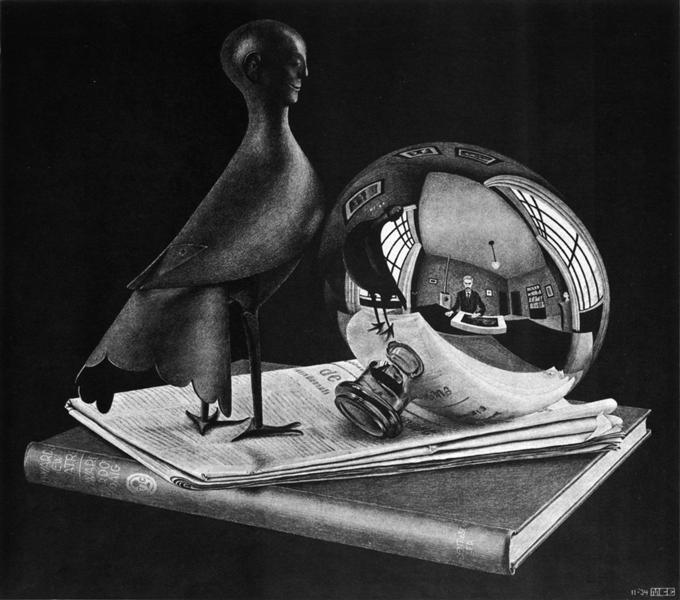En Emanuel Swedenborg, nacido el 29 de enero de 1688 en Suecia, confluyeron, en una peculiar coexistencia, la ciencia, la filosofía, la teología y la mística. Uno de los escritores universales por excelencia, el argentino Jorge Luis Borges, lo consideró entre los hombres más extraordinarios de la historia; en uno de sus textos de referencia a Swedenborg, un poema titulado con el nombre del místico sueco (de su poemario El otro, el mismo), expresa:
Sabía, como el griego, que los días
del tiempo son espejos del Eterno. *
Compuse una microficción como si fuera una conversación –imaginaria, por supuesto– entre Jorge Luis Borges y Emanuel Swedenborg -entre ambos median más de dos siglos- (JLB y ES), basándome, con la libertad propia de la ficción, en textos varios indicados en las referencias.
============
In Emanuel Swedenborg, born on January 29, 1688 in Sweden, science, philosophy, theology and mysticism converged in a peculiar coexistence. One of the universal writers par excellence, the Argentine Jorge Luis Borges considered him one of the most extraordinary men in history; in one of his texts referring to Swedenborg, a poem entitled with the name of the Swedish mystic (from his collection of poems The other, the same), he expresses:
I knew, like the Greek, that the days
of time are mirrors of the Eternal. *
I composed a microfiction as if it were a conversation -imaginary, of course- between Jorge Luis Borges and Emanuel Swedenborg -between them there are more than two centuries- (JLB and ES), basing myself, with the freedom proper to fiction, on various texts indicated in the references.

Fuente | Source - Dominio público | Public Domain
JLB: Comencé a leerlo, maestro, siendo muy joven, en inglés, pues no existía entonces ninguna traducción al español. Lo descubrí gracias al sabio Emerson. Me arrobó, por el hermoso misterio que transmitían sus precisas palabras de viajero al otro mundo. Escribí e, incluso, me atreví a disertar sobre usted ** . Desde hace años he querido tener esta conversación, que hoy me permite la imaginación.
ES: Me honra con esta oportunidad, poeta, y mucho más con lo que antes ha hecho en mi favor, usted que tanta dedicación ha puesto en lo eterno. Yo solo he sido una especie de intermediario elegido para comunicar lo divino.
JLB: Precisamente, esa elección ha sido una de mis inquietudes, si se puede decir así. ¿Cómo, después de tantos años dedicados a la indagación científica, a los inventos y logros en matemáticas, química, anatomía, astronomía y otras ciencias, a los cincuenta y siete años abandona ese camino laureado para dedicarse enteramente a lo religioso?
ES: En mí siempre estuvo la búsqueda de respuestas a mis inquietudes acerca del alma, la fe, la vida eterna, que me venían desde niño, por las influencias del medio familiar y cultural. Luego aparecieron los sueños y visiones que me impresionaban. Hasta esa especie de iluminación que ocurrió en Londres y me hizo cambiar definitivamente.
JLB: Emerson lo calificó de verdadero místico, carácter que Scholem define como “aquel al que se ha concedido una expresión inmediata, y sentida como real, de la divinidad, de la realidad última”. ¿Se sintió así?
ES: No me gusta hablar de mí ni de mis experiencias. Pero, humildemente, pienso que tuve una experiencia intensa, extraordinaria con lo espiritual, sin que llegara a ser extática. Pude tener la revelación de los órdenes humanos y divinos, del cielo y el infierno, de ángeles y demonios.

JLB: Claro, de allí su inteligente libro Sobre el cielo y sus maravillas y sobre el infierno ***. En su exploración del otro mundo no dejó usted de expresarse con claridad y precisión, como si nos envolviera en una espiritualidad racional, si cabe el oxímoron.
ES: La salvación no solo puede ser por la ética, es decir, por el bien, sino también intelectualmente, o sea, por la inteligencia, que es luz por la verdad.
JLB: Y el poeta William Blake agregaría la salvación estética (por el arte). A propósito de esto, tuvo usted una gran inclinación por la poesía. Uno de los aspectos que me cautivaron siempre de su filosofía teológica fue el de las correspondencias, que un siglo después el poeta Baudelaire acogiera como principio de su visión poética.
ES: Las correspondencias es legado de los antiguos; es la forma de manifestarse e inteligir la secreta o simbólica relación entre las cosas, de arriba y abajo, de cielo y tierra, de lo humano y lo celestial. Por eso escribí en el libro que usted mencionó: “todo cuanto existe en la naturaleza, desde lo más pequeño hasta lo más grande en ella, son correspondencias. La razón por la cual son correspondencias es que el mundo natural con todo lo suyo existe y subsiste por el mundo espiritual, y ambos por lo Divino.”
JLB: La creación es una escritura secreta, una criptografía que debemos interpretar.
Y Borges despertó, con el aleph en su mano.

Fuente | Source - Dominio público | Public Domain
JLB: I began to read it, maestro, when I was very young, in English, since there was no Spanish translation at that time. I discovered it thanks to the wise Emerson. I was enraptured by the beautiful mystery conveyed by his precise words of a traveler to the other world. I wrote and even dared to dissert about you ** . For years I have wanted to have this conversation, which today allows me the imagination.
ES: You honor me with this opportunity, poet, and much more with what you have done before in my favor, you who have put so much dedication in the eternal. I have only been a sort of chosen intermediary to communicate the divine.
JLB: Precisely, that choice has been one of my concerns, if I may say so. How, after so many years dedicated to scientific research, to inventions and achievements in mathematics, chemistry, anatomy, astronomy and other sciences, at the age of fifty-seven you abandon that laureate path to devote yourself entirely to the religious?
ES: In me there was always the search for answers to my concerns about the soul, faith, eternal life, which came to me as a child, due to the influences of my family and cultural environment. Then came the dreams and visions that impressed me. Until that kind of enlightenment that happened in London and made me change definitively.
JLB: Emerson called you a true mystic, a character that Scholem defines as "one who has been granted an immediate expression, and felt as real, of divinity, of ultimate reality". Did you feel that way?
ES: I don't like to talk about myself or my experiences. But, humbly, I think I had an intense, extraordinary experience with the spiritual, without being ecstatic. I was able to have the revelation of the human and divine orders, of heaven and hell, of angels and demons.
JLB: Of course, hence your clever book On Heaven and its Wonders and on Hell ***. In your exploration of the other world you did not fail to express yourself with clarity and precision, as if you were enveloping us in a rational spirituality, if the oxymoron fits.
ES: Salvation can be not only through ethics, that is, through good, but also intellectually, that is, through intelligence, which is light through truth.
JLB: And the poet William Blake would add aesthetic salvation (through art). In this regard, you had a great inclination for poetry. One of the aspects of your theological philosophy that always captivated me was that of the correspondences, which a century later the poet Baudelaire embraced as a principle of his poetic vision.

ES: The correspondences is a legacy of the ancients; it is the way of manifesting and understanding the secret or symbolic relationship between things, between above and below, between heaven and earth, between the human and the celestial. That is why I wrote in the book you mentioned: "everything in nature, from the smallest to the largest in it, are correspondences in nature, from the smallest to the largest, are correspondences. The reason why they are correspondences is that the natural world with all its own exists and subsists for the spiritual world, and both for the Divine."
JLB: Creation is a secret writing, a cryptography that we must interpret, I remembered saying.
And Borges awoke, with the aleph in his hand.
============
*Aquí en poema completo “Emanuel Swedenbord” de Borges en español. Here is the complete poem "Emanuel Swedenbord" by Borges in English.
** Borges dictó una conferencia sobre Swedenborg en la Universidad de Belgrano en 1978. Aquí el enlace, si quieren leerla.
*** El cielo y el infierno puede encontrarlo en español para leerlo y/o descargar en este enlace. Heaven and hell can find it in English aquí.
Referencias | References:
Borges, Jore Luis (1981). Obra poética 1923-1977 (2ª ed.). España: Añianza Editorial
https://es.wikipedia.org/wiki/Emanuel_Swedenborg
https://en.wikipedia.org/wiki/Emanuel_Swedenborg
https://docs.google.com/viewer?a=v&pid=sites&srcid=ZGVmYXVsdGRvbWFpbnxtaXNpbWFnZW5hc3xneDo3YWM2MThlMGQ3ZWY3MDQy
https://repositorio.uca.edu.ar/handle/123456789/11276
https://borgestodoelanio.blogspot.com/2015/03/jorge-luis-borges-emanuel-swedenborg.html
http://www.alconet.com.ar/varios/mitologia/leyendas/borges_y_el_misterio_de_swedenborg.html

Gracias por su lectura | Thank you for reading.




The rewards earned on this comment will go directly to the people sharing the post on Twitter as long as they are registered with @poshtoken. Sign up at https://hiveposh.com.
Lo felicito. Siempre de altísima calidad sus posts. En este caso reúne, con sobresaliente imaginación y a pesar del tiempo que los separa, a dos personajes importantes de la historia universal: un místico y un poeta. Se deja de lado, por un instante, el positivismo y el pragmatismo que en estos tiempos nos abruma. Hace falta, creo yo, más literatura de esta naturaleza.